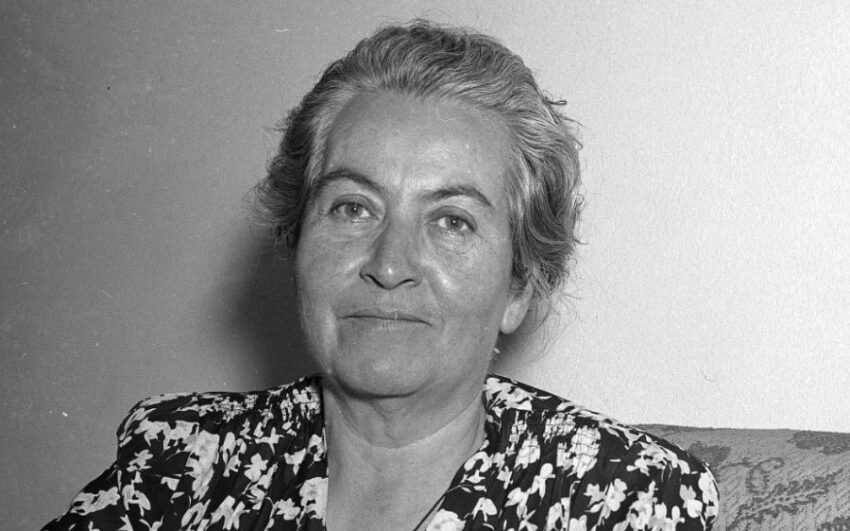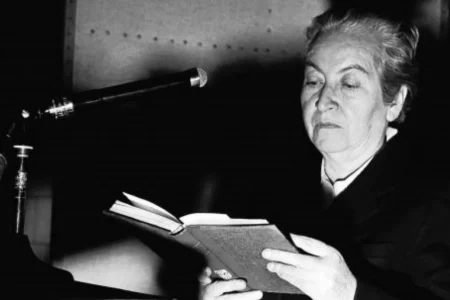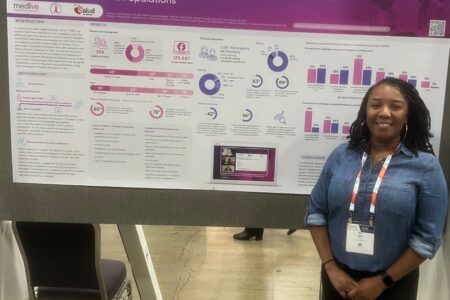
Share On Social!
Gabriela Mistral, born as Lucila Godoy Alcayaga in Chile, was the first Latina author to receive the Nobel Prize in Literature in 1945.
Her poems explore issues of spirituality, heartbreak, death, and childhood.
But beyond her verse and prose, Mistral also changed lives in Latin America and beyond through advocacy, education, and diplomacy.
“She tried to speak for [people] through her poetry, her many newspaper articles, her letters, and her talks and actions as Chilean representative in international organizations,” according to the Poetry Foundation. “Above all, she was concerned about the future of Latin America and its peoples and [lifestyles], particularly those of the native groups.”
Gabriela Mistral – Her Early Life
Born in 1889, Mistral grew up in a northern village of Monte Grande in Chile with her mother and sister.
Mistral’s love for poetry was inspired by her father, a schoolteacher who also wrote poems and would often sing and play the guitar for her.
Despite his influence, Mistral’s father ultimately left the family when Gabriela was only 3 years old. She only saw him on rare occasions.
Her grandmother would also contribute her interest in poetry and literature by encouraging her to memorize Bible verses and teaching her biblical poems.
Mistral would face challenges early, leaving her family at age 11 to attend school in the town of Vicuña.
There, she would experience more obstacles after being accused of stealing school supplies and denied admission to the Normal School in La Serena, with teachers labeling Mistral and her writings as a “troublemaker” and “not a Christian.”
Undeterred by these negative experiences, Mistral continued studying and writing.
“These experiences taught Mistral about life, justice, and fairness, so she began to write about her experiences,” the National Women’s History Museum reported.
Gabriela Mistral – Championing the Cause of the Overlooked
Mistral started submitting her writings to newspapers while working as a teacher’s aide.
In 1906, Gabriela published an article, “La instrucción de la mujer,” or “The education of women,” bringing attention to the limits placed on women’s education.
She earned her teaching certificate by studying on her own to pass the teachers exam in 1910. She immediately began teaching in many different regions across Chile.
“She boldly [spoke up] for the rights of women, children, the poor, and many other groups in her community,” according to the National Women’s History Museum.
Mistral’s first publication outside of Chile came in 1913 when a literary magazine in Paris called Elegancias published a short story and a few of her poems.
Following this, Gabriela was appointed as the principal of the Liceo de Niñas, a high school for Girls in Punta Arenas by the future president of Chile.
“Mistral also organized many important initiatives during that time including evening classes for workers who could not attend school and classes for the poor,” according to the National Women’s History Museum.
Mistral later became the principal in the Chilean Indian territory of Liceo de Niñas in Temuco.
While there, she witnessed the mistreatment of the Native Indian population and was inspired to write about it in “Poemas de la madre más triste” (Poems of the Saddest Mother).
“She was always concerned about the needs of the poor and the disenfranchised, and every time she could do something about them, she acted, disregarding personal gain,” according to the Poetry Foundation.
Gabriela Mistral – Making an Impact on Literature, Education, Diplomacy
In 1914, Mistral won a Chilean prize for her work, “Sonetos de la muerte.”
Her work often dealt with competing issues, such as love and jealousy, life and death, and dream and truth, according to the Poetry Foundation.

“All of her lyrical voices represent the different aspects of her own personality and have been understood by critics and readers alike as the autobiographical voices of a woman whose life was marked by an intense awareness of the world and of human destiny,” according to the Poetry Foundation.
By 1921, Mistral was the principal of a new and prestigious school in the capital of Chile.
“She played an important role in the educational systems of Mexico and Chile, was active in cultural committees of the League of Nations, and was Chilean consul in Naples, Madrid, and Lisbon,” according to The Nobel Prize website.
Mistral would eventually move to Mexico to help rebuild the education system after the Mexican Revolution.
The publication of her first book of poems, Desolación, came in 1922. In 1924, her second book, Ternura, was published.
In 1925, Mistral became the secretary of the Latin American section in the League of Nations in Paris, while continuously teaching classes at various colleges including Columbia University, Barnard College, and Middlebury College.
“[Mistral was] a courageous social activist whose art and writings against fascism reveal a passionate voice for freedom and justice,” according to a book about her life.
Gabriela Mistral – Her Lasting Accomplishments
On Nov. 15, 1945, she became the first Latin American to receive the Nobel Prize in Literature. A few years later, she was awarded the National Literature Prize in Chile.
Mistral died on Jan. 10, 1957 at age 67.
But her works and contributions to Latino society continue to live on.
Here is an example of her work, from the Poetry Foundation:
La bruma espesa, eterna, para que olvide dónde
Me ha arrojado la mar en su ola de salmuera.
La tierra a la que vine no tiene primavera:
Tiene su noche larga que cual madre me esconde
(Fog thickens, eternal, so that I may forget where
the sea has thrown me in its wave of brine.
The land I have come to knows no spring:
it has its long night that like a mother hides me).
“One of the best-known Latin American poets of her time, Gabriela—as she was admiringly called all over the Hispanic world—embodied in her person, as much as in her works, the values and traditions of a continent that had not been recognized until then with the most prestigious international literary prize,” according to the Poetry Foundation.
Find poems by Mistral here or here.
Read about other Salud Heroes who are changing systems, policies, and history to create healthier communities for Latinos and all people!
*Editors Note: Featured image from CNN Chile.
By The Numbers
84
percent
of Latino parents support public funding for afterschool programs
This success story was produced by Salud America! with support from the Robert Wood Johnson Foundation.
The stories are intended for educational and informative purposes. References to specific policymakers, individuals, schools, policies, or companies have been included solely to advance these purposes and do not constitute an endorsement, sponsorship, or recommendation. Stories are based on and told by real community members and are the opinions and views of the individuals whose stories are told. Organization and activities described were not supported by Salud America! or the Robert Wood Johnson Foundation and do not necessarily represent the views of Salud America! or the Robert Wood Johnson Foundation.



